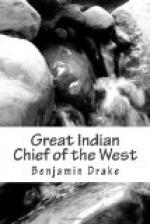numbers of a gigantic and growing foe, seemed
to have submitted to their fate, and the pioneer had
ceased to number the war-whoop among the inquietudes
of the border life. The plains of Illinois
and Missouri were rapidly becoming peopled by
civilized men. A race less hardy than the backwoodsmen
were tempted by the calm to migrate to those
delightful solitudes, that bloomed with more
than Arcadian fascinations of fruitfulness and beauty.
The smoke of the settler’s cabin began to ascend
from the margin of every stream in that wide
region, and the cattle strayed through rich pastures,
of which the buffalo, the elk, and the deer, had
long enjoyed a monopoly—an unchartered monopoly—wondering,
no doubt, at their good luck in having their
lives cast in such pleasant places.
It was the writer’s lot to ramble over that beautiful country while these interesting scenes were presented; while the wilderness still glowed in its pristine luxuriance: while the prairie-grass and the wild flowers still covered the plain, and the deer continued to frequent his ancient haunts, and while the habitations of the new settlers were so widely and so thinly scattered, that the nearest neighbors could scarcely have exchanged the courtesy of an annual visit without the aid of the seven-leagued boots of ancient story. But though in solitude, they lived without fear. There were none to molest nor make them afraid. If they had few friends, they had no enemies. If the Indian halted at the settler’s door, it was to solicit hospitality, not to offer violence. But more frequently he stalked silently by, timid of giving offence to the white man, whom he doubtless regarded as an intruder upon his own ancient heritage, but whose possession he had been taught to respect, because he had ever found it guarded by a strong and swift arm, that had never failed to repay aggression with ten-fold vengeance. Suddenly, however, a change came over this cheering scene. The misconduct of a few white men disturbed the harmony of a wide region. The Indians were oppressed and insulted to the last point of forbearance, and a small but restless band, regarded as insubordinate and troublesome even by their own nation, seized upon the occasion to rush to war.
It is wonderful to look back upon this eventful history. The country over which Black Hawk, with a handful of followers, badly armed, and destitute of stores or munitions of war, roamed for hundreds of miles, driving off the scattered inhabitants, is now covered with flourishing settlements, with substantial houses, and large farms—not with the cabins and clearings of bordermen—but with the comfortable dwellings and the well-tilled fields of independent farmers. Organized counties and all the subordination of social life are there; and there are the noisy school-house, the decent church, the mill, the country store, the fat ox, and the sleek plough-horse. The yankee is there with his notions and his patent-rights,




